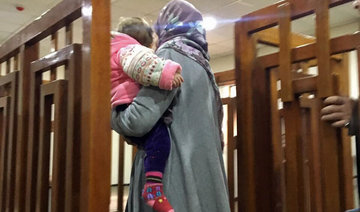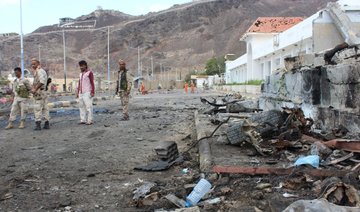LONDON: As hundreds of radical volunteers who left Europe to fight for Daesh return home from the Middle East, the British government is facing growing scrutiny over how it deals with the wives and children who accompany them.
In June 2014 Daesh claimed to have established a caliphate across a large swathe of eastern Syria and western Iraq. It demanded that Muslims everywhere pledge allegiance to its self-declared state.
A mixture of hardened extremists, convicted criminals and vulnerable young high school students from across Europe rallied to the cause, encouraged by the militants’ slick social media campaign and their formidable reputation.
But as the true nature of life under Daesh’s brutal rule became apparent and the group gradually lost ground to an international military coalition led by the US, the volunteers began to trickle home.
Last week the European Border and Coast Guard Agency, Frontex, warned that hundreds of Daesh recruits drawn from the Continent are women whose precise roles “remains elusive.” This has left analysts divided over how the British government should deal with its returnees in the months and years ahead.
Scott Lucas, a professor of international politics at the University of Birmingham, told Arab News that Daesh recruits needed to be judged on a case-by-case basis.
“Should they be allowed back? Should they be detained? Do we let them live together in society? Or do we shun them? In my opinion, you have to look to some kind of integration if they haven’t committed a crime,” he said.
While local authorities in countries such as Denmark and Sweden run rehabilitation and reintegration programs for their returning militants, opinion in the UK is split over how best to deal with British radicals who went to Syria and Iraq.
In December, British Defense Secretary Gavin Williamson caused controversy when he told the Daily Mail that Britons who have fought for Daesh should never “be allowed back into this country.” His fellow minister Rory Stewart told BBC radio last autumn that “in almost every case” the only way to deal with British Daesh recruits was “to kill them” before they return home.
The recent Frontex report estimates that almost 1,000 women from Europe have joined militant groups in Syria, Iraq or Libya, with most of them filling the ranks of Daesh. Adding to an already complex situation are “several hundred minors” who were born or brought up in and around the battlefields of the Middle East. It warned that while the exact responsibilities of the female recruits have proved difficult to determine, “many women have expressed the desire to take more active roles within Daesh.”
But experts told Arab News that the UK would be wrong to try to arrest every extremist who arrives home in the weeks and months ahead.
“Reintegration programs are the way forward. If you put a blanket ban on all returnees associated with (Daesh) and just leave them out of the country, you’re not dealing with the issue,” said Lucas. “You’ll probably feed further radicalization by fueling their anger and estrangement.”
In 2006 the government of former Prime Minister Tony Blair formally announced a new counter-terrorism strategy known as Prevent, with the aim of identifying potential extremists and stopping them from joining radical groups. The strategy has proved highly divisive, with critics arguing that it encourages Muslims to spy on each other.
There is still no major government-run rehabilitation scheme for former Daesh members and in 2014 the UK passed legislation that allows it to strip terrorism suspects of their citizenship, even if it means they are left stateless.
Chris Doyle, the director of the Council for Arab-British Understanding, called for the cases of all returnees to be assessed on their own merits. He told Arab News many Daesh recruits “became deeply disillusioned by what they found” in Syria and Iraq and should be carefully integrated back into British society, while those who remained loyal to the extremist group could be imprisoned.
“We can’t create a situation where they feel they can’t return because there is no option for them,” he said.
Last October the Soufan Center, a New York-based think tank, estimated that 850 British Daesh recruits had gone to Syria or Iraq, compared to 915 from Germany and 1,910 from France. It estimated that 425 of the Britons had already returned home.
Anthony Glees, director of the center for security and intelligence studies at the University of Buckingham, told Arab News that the British government was right to try to stop Daesh recruits returning to the UK.
“We are talking about highly dangerous individuals who will have had battlefield experience and training in explosives. Their ‘brides’ may also have been radicalized by the violence their husbands have been involved in,” he said.
UK split over whether to kill or ‘cure’ Daesh recruits
UK split over whether to kill or ‘cure’ Daesh recruits

Nearly 2 million military casualties in Ukraine war: study

- “No major power has suffered anywhere near these numbers of casualties or fatalities in any war since World War II,” CSIS said
WASHINGTON, United States: Russia’s grinding invasion of Ukraine has caused nearly two million military casualties — killed, wounded or missing — between the two countries, according to a study published Tuesday by a US think tank.
Moscow’s forces have borne the brunt of the losses, suffering as many as 325,000 killed out of an estimated total of 1.2 million casualties since invading Ukraine nearly four years ago, the Center for Strategic and International Studies (CSIS) found.
“No major power has suffered anywhere near these numbers of casualties or fatalities in any war since World War II,” CSIS said, noting that “Russian forces are advancing remarkably slowly on the battlefield.”
Ukrainian forces have also suffered major losses — between 500,000 and 600,000 casualties, of which between 100,000 and 140,000 were killed — from February 2022 to December 2025, the think tank said.
“Combined Russian and Ukrainian casualties may be as high as 1.8 million and could reach two million total casualties by the spring of 2026,” CSIS said.
In February 2025, Ukrainian President Volodymyr Zelensky told a US television outlet that his country had lost nearly 46,000 troops since 2022 — a figure that analysts consider an underestimate — while tens of thousands of others were missing or had been taken prisoner.
The BBC’s Russian service and the Mediazona outlet, which rely on publicly available data such as death notices, have identified more than 163,000 Russian soldiers killed in four years of war, while acknowledging that the actual number is likely higher.
The war has also taken a heavy toll on civilians, with United Nations monitors recording more civilian deaths in Ukraine in 2025 than in any other year except 2022.
More than 2,500 civilians were killed and over 12,000 wounded in 2025, the Office of the UN High Commissioner for Human Rights said, noting that the UN has verified almost 15,000 civilian deaths since 2022, but that the total “is likely considerably higher.”














